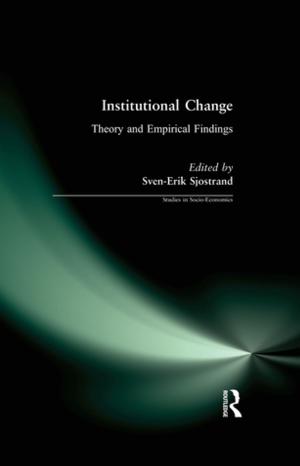Practical Environmental Ethics
Nonfiction, Social & Cultural Studies, Political Science, Government, Public Policy| Author: | A. Pablo Iannone | ISBN: | 9781351497282 |
| Publisher: | Taylor and Francis | Publication: | July 12, 2017 |
| Imprint: | Routledge | Language: | English |
| Author: | A. Pablo Iannone |
| ISBN: | 9781351497282 |
| Publisher: | Taylor and Francis |
| Publication: | July 12, 2017 |
| Imprint: | Routledge |
| Language: | English |
This essential volume for professionals and academics proposes a new approach to environmental ethics and to environmental policymaking in particular. All too frequently, policy makers focus only on what ends should ideally be pursued, ignoring whether the means have any negative unintended consequences. Such approaches tend to have a focus on consequentialist, deontological, virtue-cantered, or care-based theories which makes them too singularly-minded. They are not suitable for dealing with the complexities of life and, especially, environmental policy making.
Practical Environmental Ethics distinguishes between cases in which entire ecosystems are at risk, threatening entire societies where collective consequences take precedence and cases in which whole ecosystems are not at risk where individual rights or duties take precedence. In doing this, Iannone discusses environmental controversies not only philosophically, but in the complex contexts at work within policy-making and decision-making communities. This allows for consideration of crucial concepts used in morality, biology, technology, business, economics, politics, and philosophy.
Relying on numerous actual environmental cases, Iannone helps formulate realistic ways of logically and ethically determining how environmental controversies should be addressed. Ultimately, he proposes solutions that policy makers and anyone interested in this topic may utilize to clarify environmental issues and determine how to best deal with them for the greater good.
This essential volume for professionals and academics proposes a new approach to environmental ethics and to environmental policymaking in particular. All too frequently, policy makers focus only on what ends should ideally be pursued, ignoring whether the means have any negative unintended consequences. Such approaches tend to have a focus on consequentialist, deontological, virtue-cantered, or care-based theories which makes them too singularly-minded. They are not suitable for dealing with the complexities of life and, especially, environmental policy making.
Practical Environmental Ethics distinguishes between cases in which entire ecosystems are at risk, threatening entire societies where collective consequences take precedence and cases in which whole ecosystems are not at risk where individual rights or duties take precedence. In doing this, Iannone discusses environmental controversies not only philosophically, but in the complex contexts at work within policy-making and decision-making communities. This allows for consideration of crucial concepts used in morality, biology, technology, business, economics, politics, and philosophy.
Relying on numerous actual environmental cases, Iannone helps formulate realistic ways of logically and ethically determining how environmental controversies should be addressed. Ultimately, he proposes solutions that policy makers and anyone interested in this topic may utilize to clarify environmental issues and determine how to best deal with them for the greater good.















